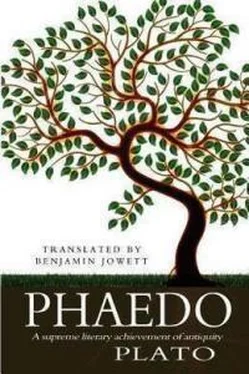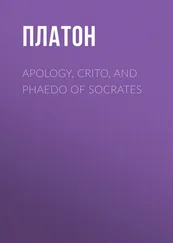Платон - Phaedo
Здесь есть возможность читать онлайн «Платон - Phaedo» весь текст электронной книги совершенно бесплатно (целиком полную версию без сокращений). В некоторых случаях можно слушать аудио, скачать через торрент в формате fb2 и присутствует краткое содержание. Год выпуска: 2014, Издательство: epubBooks Classics, Жанр: Философия, на английском языке. Описание произведения, (предисловие) а так же отзывы посетителей доступны на портале библиотеки ЛибКат.
- Название:Phaedo
- Автор:
- Издательство:epubBooks Classics
- Жанр:
- Год:2014
- ISBN:нет данных
- Рейтинг книги:3 / 5. Голосов: 1
-
Избранное:Добавить в избранное
- Отзывы:
-
Ваша оценка:
- 60
- 1
- 2
- 3
- 4
- 5
Phaedo: краткое содержание, описание и аннотация
Предлагаем к чтению аннотацию, описание, краткое содержание или предисловие (зависит от того, что написал сам автор книги «Phaedo»). Если вы не нашли необходимую информацию о книге — напишите в комментариях, мы постараемся отыскать её.
Phaedo — читать онлайн бесплатно полную книгу (весь текст) целиком
Ниже представлен текст книги, разбитый по страницам. Система сохранения места последней прочитанной страницы, позволяет с удобством читать онлайн бесплатно книгу «Phaedo», без необходимости каждый раз заново искать на чём Вы остановились. Поставьте закладку, и сможете в любой момент перейти на страницу, на которой закончили чтение.
Интервал:
Закладка:
ECHECRATES: Yes.
PHAEDO: He was quite beside himself; and I and all of us were greatly moved.
ECHECRATES: Who were present?
PHAEDO: Of native Athenians there were, besides Apollodorus, Critobulus and his father Crito, Hermogenes, Epigenes, Aeschines, Antisthenes; likewise Ctesippus of the deme of Paeania, Menexenus, and some others; Plato, if I am not mistaken, was ill.
ECHECRATES: Were there any strangers?
PHAEDO: Yes, there were; Simmias the Theban, and Cebes, and Phaedondes; Euclid and Terpison, who came from Megara.
ECHECRATES: And was Aristippus there, and Cleombrotus?
PHAEDO: No, they were said to be in Aegina.
ECHECRATES: Any one else?
PHAEDO: I think that these were nearly all.
ECHECRATES: Well, and what did you talk about?
PHAEDO: I will begin at the beginning, and endeavour to repeat the entire conversation. On the previous days we had been in the habit of assembling early in the morning at the court in which the trial took place, and which is not far from the prison. There we used to wait talking with one another until the opening of the doors (for they were not opened very early); then we went in and generally passed the day with Socrates. On the last morning we assembled sooner than usual, having heard on the day before when we quitted the prison in the evening that the sacred ship had come from Delos, and so we arranged to meet very early at the accustomed place. On our arrival the jailer who answered the door, instead of admitting us, came out and told us to stay until he called us. 'For the Eleven,' he said, 'are now with Socrates; they are taking off his chains, and giving orders that he is to die to–day.' He soon returned and said that we might come in. On entering we found Socrates just released from chains, and Xanthippe, whom you know, sitting by him, and holding his child in her arms. When she saw us she uttered a cry and said, as women will: 'O Socrates, this is the last time that either you will converse with your friends, or they with you.' Socrates turned to Crito and said: 'Crito, let some one take her home.' Some of Crito's people accordingly led her away, crying out and beating herself. And when she was gone, Socrates, sitting up on the couch, bent and rubbed his leg, saying, as he was rubbing: How singular is the thing called pleasure, and how curiously related to pain, which might be thought to be the opposite of it; for they are never present to a man at the same instant, and yet he who pursues either is generally compelled to take the other; their bodies are two, but they are joined by a single head. And I cannot help thinking that if Aesop had remembered them, he would have made a fable about God trying to reconcile their strife, and how, when he could not, he fastened their heads together; and this is the reason why when one comes the other follows, as I know by my own experience now, when after the pain in my leg which was caused by the chain pleasure appears to succeed.
Upon this Cebes said: I am glad, Socrates, that you have mentioned the name of Aesop. For it reminds me of a question which has been asked by many, and was asked of me only the day before yesterday by Evenus the poet—he will be sure to ask it again, and therefore if you would like me to have an answer ready for him, you may as well tell me what I should say to him:—he wanted to know why you, who never before wrote a line of poetry, now that you are in prison are turning Aesop's fables into verse, and also composing that hymn in honour of Apollo.
Tell him, Cebes, he replied, what is the truth—that I had no idea of rivalling him or his poems; to do so, as I knew, would be no easy task. But I wanted to see whether I could purge away a scruple which I felt about the meaning of certain dreams. In the course of my life I have often had intimations in dreams 'that I should compose music.' The same dream came to me sometimes in one form, and sometimes in another, but always saying the same or nearly the same words: 'Cultivate and make music,' said the dream. And hitherto I had imagined that this was only intended to exhort and encourage me in the study of philosophy, which has been the pursuit of my life, and is the noblest and best of music. The dream was bidding me do what I was already doing, in the same way that the competitor in a race is bidden by the spectators to run when he is already running. But I was not certain of this, for the dream might have meant music in the popular sense of the word, and being under sentence of death, and the festival giving me a respite, I thought that it would be safer for me to satisfy the scruple, and, in obedience to the dream, to compose a few verses before I departed. And first I made a hymn in honour of the god of the festival, and then considering that a poet, if he is really to be a poet, should not only put together words, but should invent stories, and that I have no invention, I took some fables of Aesop, which I had ready at hand and which I knew—they were the first I came upon—and turned them into verse. Tell this to Evenus, Cebes, and bid him be of good cheer; say that I would have him come after me if he be a wise man, and not tarry; and that to–day I am likely to be going, for the Athenians say that I must.
Simmias said: What a message for such a man! having been a frequent companion of his I should say that, as far as I know him, he will never take your advice unless he is obliged.
Why, said Socrates,—is not Evenus a philosopher?
I think that he is, said Simmias.
Then he, or any man who has the spirit of philosophy, will be willing to die, but he will not take his own life, for that is held to be unlawful.
Here he changed his position, and put his legs off the couch on to the ground, and during the rest of the conversation he remained sitting.
Why do you say, enquired Cebes, that a man ought not to take his own life, but that the philosopher will be ready to follow the dying?
Socrates replied: And have you, Cebes and Simmias, who are the disciples of Philolaus, never heard him speak of this?
Yes, but his language was obscure, Socrates.
My words, too, are only an echo; but there is no reason why I should not repeat what I have heard: and indeed, as I am going to another place, it is very meet for me to be thinking and talking of the nature of the pilgrimage which I am about to make. What can I do better in the interval between this and the setting of the sun?
Then tell me, Socrates, why is suicide held to be unlawful? as I have certainly heard Philolaus, about whom you were just now asking, affirm when he was staying with us at Thebes: and there are others who say the same, although I have never understood what was meant by any of them.
Do not lose heart, replied Socrates, and the day may come when you will understand. I suppose that you wonder why, when other things which are evil may be good at certain times and to certain persons, death is to be the only exception, and why, when a man is better dead, he is not permitted to be his own benefactor, but must wait for the hand of another.
Very true, said Cebes, laughing gently and speaking in his native Boeotian.
I admit the appearance of inconsistency in what I am saying; but there may not be any real inconsistency after all. There is a doctrine whispered in secret that man is a prisoner who has no right to open the door and run away; this is a great mystery which I do not quite understand. Yet I too believe that the gods are our guardians, and that we are a possession of theirs. Do you not agree?
Yes, I quite agree, said Cebes.
And if one of your own possessions, an ox or an ass, for example, took the liberty of putting himself out of the way when you had given no intimation of your wish that he should die, would you not be angry with him, and would you not punish him if you could?
Читать дальшеИнтервал:
Закладка:
Похожие книги на «Phaedo»
Представляем Вашему вниманию похожие книги на «Phaedo» списком для выбора. Мы отобрали схожую по названию и смыслу литературу в надежде предоставить читателям больше вариантов отыскать новые, интересные, ещё непрочитанные произведения.
Обсуждение, отзывы о книге «Phaedo» и просто собственные мнения читателей. Оставьте ваши комментарии, напишите, что Вы думаете о произведении, его смысле или главных героях. Укажите что конкретно понравилось, а что нет, и почему Вы так считаете.










